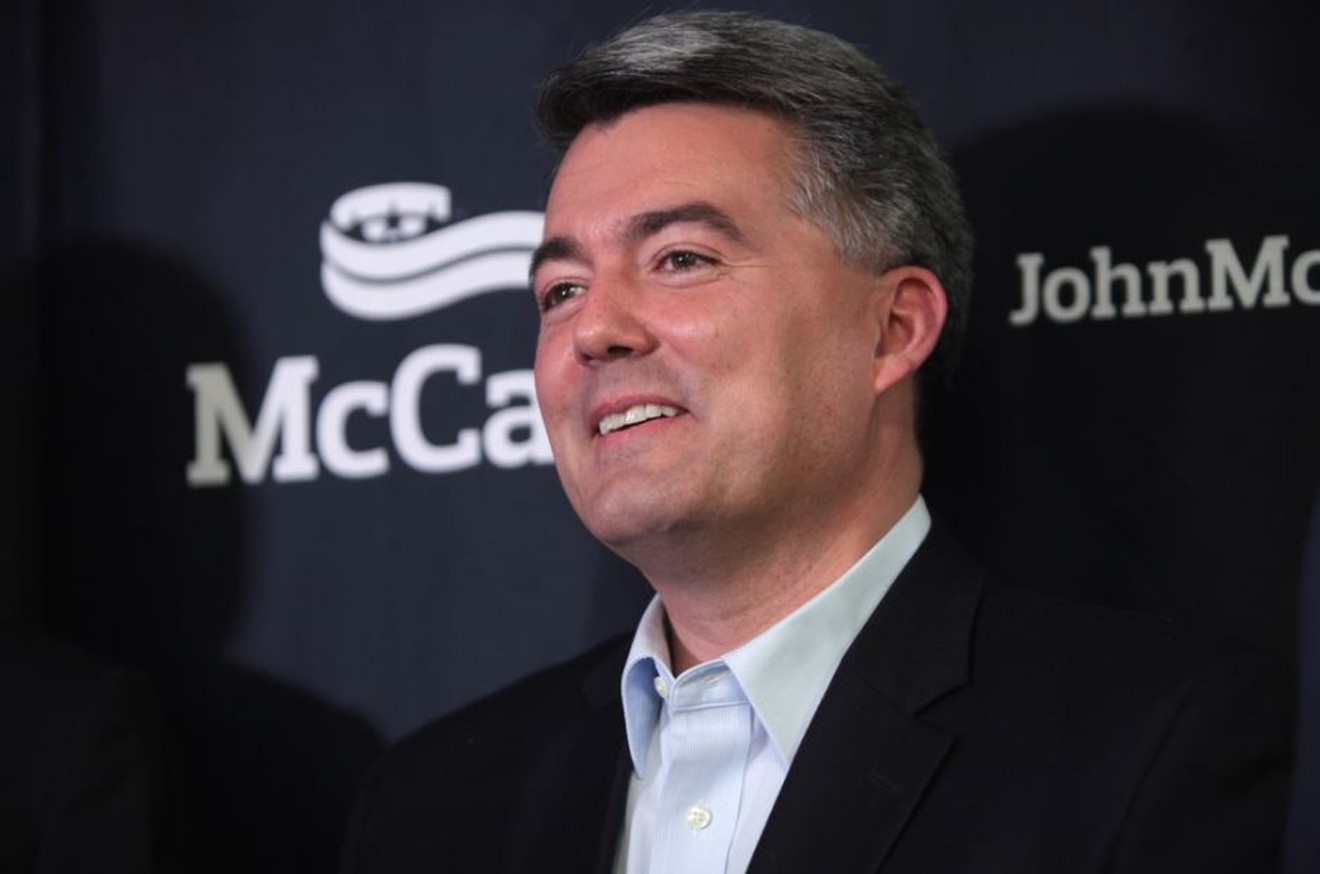Tuesday marked the first formal declaration in this most recent iteration of the health-care debate for the first-term senator from Yuma, who'd been mostly silent in recent weeks about how he was going to vote on the issue. On Tuesday, Wednesday and Thursday night, Gardner also voted in favor of three different amendments that would have either partially or fully replaced Obamacare, making him one of 39 Republicans (out of 52) to do so.
Gardner's silence prior to this week, of course, was calculated. As a Republican senator in a swing state that doesn't particularly like Donald Trump, attention means protests, including an ugly incident last month at his Denver office that saw disabled protesters arrested and forcibly removed.

Wheelchair Sports Camp MC Kalyn Heffernan joins an ADAPT protest demanding that Cory Gardner vote against the Republican-led repeal of the Affordable Care Act.
Kalyn Heffernan
With that dilemma in mind, here's a look at three political reasons for Gardner to continue to support his party's efforts, and three political reasons for him to be a maverick and side with senators Lisa Murkowski and Susan Collins in publicly rebuking efforts to get the legislation passed. Gardner's decision could have a huge impact on his 2020 re-election campaign.
Let's start with three reasons for Gardner to support ongoing Republican efforts to repeal Obamacare, as he's done consistently so far:
1. He thinks it's the right thing to do.
Make no mistake about it: Gardner's a through-and-through conservative who firmly believes in small government.
In his statement on voting for the motion to proceed, Gardner, as he's done all the way back to his days in the House, bashed "failing" Obamacare and mostly pointed to insurance-premium hikes and tax penalties.
"Under Obamacare, Coloradans have had to pay for double-digit premium increases year after year, and the 27 percent average increase for premiums on the individual market next year is only more of the same. While 500,000 Coloradans have had their plans canceled, 145,000 Coloradans were forced to pay a penalty under Obamacare," Gardner said after Tuesday's vote.
Gardner's limited-government stance on health care is clear and unquestioned. Which leads us to...
2. He got elected to do this.
Make no mistake about it: Politicians must do what their voters wish. When Gardner ran for Senate in 2014 and said that he wanted to get rid of Obamacare, well, that's part of what he's probably going to try and do now that he's in office. (By the way, he won his election by nearly 40,000 votes.)
Gardner was a leading House voice against Obamacare, voting in January 2011 to repeal it after repeatedly saying he would, referring to the legislation as "an overreaching power of government." Through his time in the House of Representatives, Gardner's anti-Obamacare stance couldn't have been clearer unless he'd worn an "I Hate Obamacare" T-shirt."Gardner's anti-Obamacare stance couldn't have been clearer unless he'd worn an "I Hate Obamacare" T-shirt."
tweet this
That said, public opinion has changed significantly since 2014. We'll touch on this later.
3. He's a first-term senator in a big role.
Imagine starting a new job, say, as a grocery store clerk, and within your first few months, you're suddenly a big-wig manager. As chairman of the National Republican Senatorial Committee, Gardner is one of the seven Republican senators in a leadership position on his side of the aisle. It's also a job previously held by current Republican leader Mitch McConnell and his deputy, John Cornyn, among others. In other words, Gardner's a pretty big deal and is on a fast track (should he remain in office, of course) to climb the ranks of senior Republican senators over the next few years.
It's also particularly impressive for a 42-year-old first-term senator to be in charge of filling the coffers of his fellow Republicans, particularly as they prepare to defend key seats in Nevada (Dean Heller) and Arizona (Jeff Flake) in 2018 and potentially expand their senatorial majority.
Any reservations Gardner may have about the health-care legislation would probably be canceled out by his Republican big-wig status. None of the other six leaders (McConnell, Cornyn, John Thune, Mike Crapo, Roy Blunt and John Barrasso) strayed from party lines in any of Tuesday, Wednesday or Thursday's four health care votes. None of the seven were considered by most pundits as potential Republican votes to watch, either.
Here are three reasons why Gardner may not want to support health-care legislation that could repeal Obamacare:
1. The bill *potentially* hits Colorado's Trump voters the hardest.
Here's the problem, if you're Gardner: If you vote to potentially take away or limit Medicaid, not only do you anger an already infuriated left, you may take away health care from people who voted for Trump in 2016 and may be primed to vote for Gardner in 2020. Of the ten Colorado counties in which Republicans made their biggest gains during the 2016 election cycle from 2012, nine of them have Medicaid user rates that are above Colorado's statewide rate of about 24 percent. In other words, the Coloradans that the Republicans picked up in the last election cycle also tended to benefit the most from Medicaid expansions under Obamacare.
Coloradans that the Republicans picked up in the last election cycle also tended to benefit the most from Medicaid expansions under Obamacare.
tweet this
Additionally, Democrats looking to unseat third district (southern/western Colorado) Republican Scott Tipton in 2018 could have extra campaign fodder should the legislation pass.
2. People do not like the Republican health-care plan.
When Gardner campaigned for office in 2014, railing against Obamacare was a common Republican rallying cry, and it worked. Gardner ripped into then-senator Mark Udall on the campaign trail, offering a finger-pointing rebuke of his 2010 vote to implement the law, saying, "He passed Obamacare with his vote." Udall was promptly voted out after just one term.
Recent polling, however, has shown that Obamacare's overall popularity is increasing and, in most cases, narrowly net favorable.
Some may argue that Obamacare wasn't exactly embraced by the public when it was enacted in 2010, with popularity ratings at the time mostly hovering in the upper 30s to around 40 percent. But the Republican health proposals have been struggling to get even half of the meager popularity that Obamacare had when it was enacted, which makes it highly unpopular on both sides of the aisle and a potential drag on Gardner and other Republicans in future elections.
3. Cory Gardner, meet television ad. Television ad, meet Cory Gardner.
TVs, phones, YouTube ads, you name it — Gardner's mug will be all over them come 2019 (or earlier). Gardner will be the prime scapegoat for Coloradans upset with the health-care legislation, and with formal votes now attached to his name, it'll be hard for Gardner to cautiously shy away from his views as he's done in recent weeks — should the legislation pass or not. And you can bet Democrats will pour money into ads — Gardner's face in black and white, accompanied by spooky music — that will play into constituents' anger.
Political decisions are harder to make than they might seem. But then again, that's why senators are elected. Gardner's had a tough one to mull over, but Tuesday offered the first clear look at where he stands.












